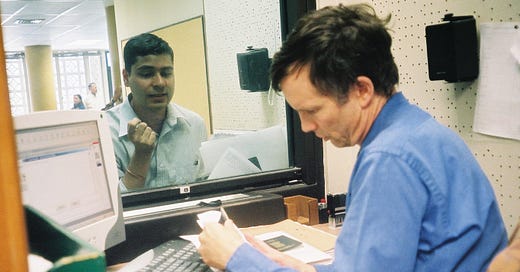Diplomacy touches our lives every day, even if few of us realize it. Almost none of the conveniences of modern life — from affordable shopping to hassle-free shipping to international travel — would be possible without bilateral and multilateral diplomatic agreements.
On my new podcast, we’ll explore how diplomacy shapes our world and our lives. We’ll examine how the practice of diplomacy evolves before our eyes and will imagine its future. New episodes will alternate with Diplomacy Notebook articles on Wednesdays, and I hope you’ll join us here on Substack or on your favorite podcast platform.
No part of diplomacy is more visible on the front lines than consular work. Among the visitors to a U.S. embassy on a typical day, most are there for a consular service — from replacing passports to registering newborn children to applying for entry visas. U.S. embassies around the world have issued millions of visas every year for decades to tourists, businesspeople, workers and students.
Both newly accepted and returning international students at U.S. colleges and universities find themselves in a precarious position. The Trump administration has suspended new visa appointments abroad, revoked some existing visas and threatened to cancel many more. Harvard students in particular face unprecedented risks as the university fights the administration’s attack on its ability to enroll foreign citizens.
In the first episode of “The Diplomacy Podcast,” we explain how student visas work and clarify what students and their families should keep in mind as they deal with the current challenges. My guest is Ambassador Janice Jacobs, our resident consular expert at the Washington International Diplomatic Academy.
As assistant secretary of state for consular affairs from 2008 to 2014, she led 12,000 employees globally. During more than three decades in the Foreign Service, she was also ambassador to Senegal and Guinea-Bissau, as well as deputy chief of mission in the Dominican Republic. Her other posts included Ecuador, Egypt, Ethiopia, France, Mexico, Nigeria and Thailand.
Nicholas Kralev is the founder and executive director of the Washington International Diplomatic Academy, and a former Financial Times and Washington Times correspondent. His books include “Diplomatic Tradecraft,” “America’s Other Army” and “Diplomats in the Trenches.”







Share this post